What are your eco-friendly grocery shopping tips for beginners and where to start? Until last week, I had been putting off transitioning towards more sustainable food shopping. For some reason, this seemed more overwhelming than the other areas of life that I had already dared to change in our family. Yet I knew that grocery shopping is one where our family could make an important difference. In particular, our plastic calculator results changed the way I looked at our way of food shopping. It was scary to see all the single-use plastic we bought home every week from our supermarket. Certainly, we were not practicing eco-friendly grocery shopping…
I think what made me to procrastinate in transitioning towards greener grocery shopping was that in our family’s division of tasks, my husband usually did the food shopping. And he only did it once per week. Transforming our grocery shopping to be more environmentally-friendly would thus mean that he would need to be fully on board.
As to me, I would need to be willing to go an extra mile and to take on more household tasks. I was also afraid that going green with food shopping would mean increasing the number of times and places where we purchased our groceries. And our food budget would skyrocket. Ultimately, transitioning towards eco-friendly grocery shopping went more smoothly than I had anticipated, though not without some challenges. Below are the things we managed to change last week. Some eco-friendly grocery shopping tips for beginners. These suggestions are great for everyone desiring to practice more sustainable food shopping. Yet in particular these tips reflect the challenges related to eco-friendly grocery shopping in France and in Geneva area.
1. Buying food in bulk
Reducing our plastic footprint was an important part of our transition towards more eco-friendly grocery shopping. In order to fight single-use plastic, I wanted to start to buy more things in bulk. I think this would be my number one eco-friendly grocery shopping tip for beginners. The supermarket where we had been shopping for our weekly food did not really allow that. Except for mostly non-organic veggies and fruits, as discussed in my blog post on water conservation. Organic vegetables and fruits are often wrapped in plastic in order to distinguish them from non-organic food, as I had learned lately.
We thus went to another grocery store called Migros, in a neighbouring village, that had a more comprehensive selection of organic food in bulk. It is a bit more expensive, but my husband and I had decided that we were ready to change our plastic consumption. Even if it would cost us a bit more to practice earth-friendly grocery shopping. Below on the picture are breakfast cereals and some rice in glass jars that I bought in Migros.
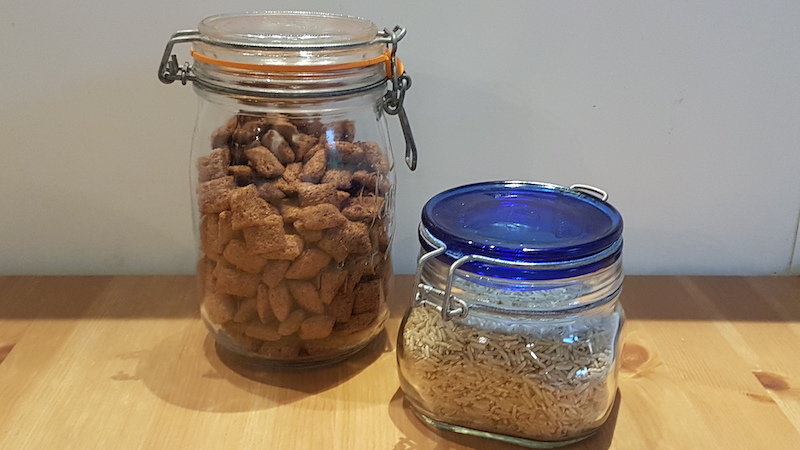
Unfortunately, the bags that Migros supermarket offers for bulk food are made half from paper and half from plastic. This discovery set back my enthusiasm about doing our weekly eco-friendly grocery shopping in this eco store.
2. Purchasing groceries with less packaging
If the product was not sold in bulk, I tried to opt for the maxi size items to reduce packaging. It is also cheaper to buy food in this way. To a certain degree, my husband was already doing this (he is good at optimising). However, I needed to get into this habit as well and break my short-term thinking while grocery shopping, as explained more in my post on greener laundry.
3. Buying all I can in organic
Being disappointed by the single-use plastic at Migros, I decided to try another visit to a French organic eco grocery store called Satoriz. The photo below and the featured photos of this blog post have also been taken in this eco store.
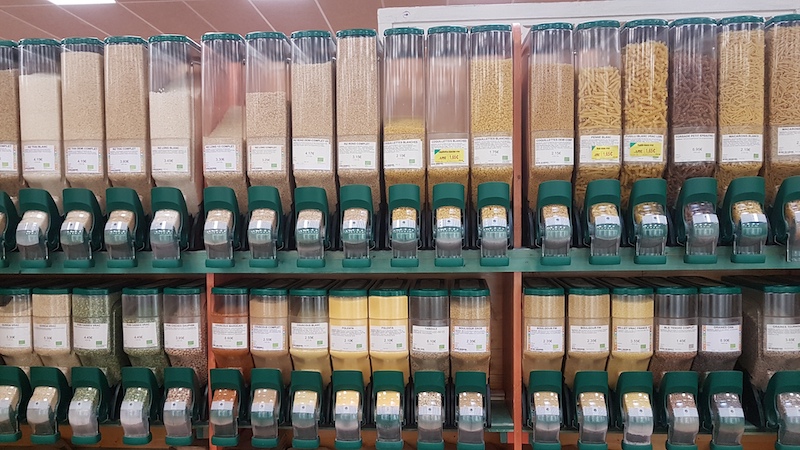
We had tried to shop in Satoriz once, maybe 4 years ago. However, the choices were still limited and prices were high, so we abandoned then eco-friendly grocery shopping. With little kids, we wanted to shop all in one place to keep it manageable.
We are lucky to have a Satoriz near Migros. Therefore, opting for the organic-only eco grocery store did not add any extra transport and did not increase our CO2 emissions. This time, both my husband and I were impressed with Satoriz. We found everything we needed there, and bulk products could be put to paper bags! The selection was much better than some years ago and made sustainable grocery shopping look like an option for us. Buying all you could in organic would be my other priority eco-friendly grocery tip for beginners.
How we felt
At first, our oldest son Lev was not happy. He wanted to go to our old not so eco-friendly grocery store. However, Lev cheered up when he discovered that he can scoop and bag his own breakfast cereals and use pliers to take out his cookies for weekly snacks. Buying all these things in bulk allowed kids to be much more involved, and they enjoyed grocery shopping more. Lev still misses his favourite yogurts and cheeses that we could not find in Satoriz. We thus promised that we would also purchase these sometimes from Migros, where they are available.
I have to also admit that switching to eco store Satoriz also shook me. For instance, I did not like the orange juice they had as much and I undercooked their brand of pasta before realising that it needed more time… Some of their products seem to also have a shorter shelf life. But I get a bit disoriented every time I switch to a new grocery store, so I guess it is just a question of time to get used to new ways and tastes.
4. Buying alternatives to plastic packaging wherever possible
Although Satoriz uses less plastic than other big grocery stores, this store’s organic products are sometimes wrapped in plastic. In addition to looking for maxi size, I had to learn also to look for alternatives to plastic. We thus got, for instance, milk in a carton, juice in a glass bottle, and pre-made food in glass jars. What we ended up still buying in plastic were processed foods, such as soya-based nuggets and cordon bleus. This store’s selection of yogurts in glass jars is not as extensive as we would like it to be. For the last problem, however, my husband proposed buying a machine that we can use to make yogurt ourselves.
CHALLENGES
Some habit changes in our way towards greener grocery shopping came with a bit more struggle.
5. Reducing consumption of food exported from other continents – only one fruit per week from other continents
Grandiose as I can be, I had first set a goal that we would not buy food from other continents at all. Yet I quickly realised that it is way too ambitious for our family. My husband was very clear and said that he is not willing to give up his beloved chocolate yet, and neither am I.
I also grew up without bananas and tangerines, as these were not really available in Soviet Union. And I did not want to deprive my kids of these fruits that they love. Thus, at the end of the day, we decided that we would try to choose products that have been grown or fabricated nearby if possible. Moreover, we limited ourselves to just one purchase per week of fruit that comes from other continents. Going zero-waste is an important goal to have, but this is what we can handle now. Progress not perfection.
6. Reducing disposable bags – my own bags with me for loose veggies and fruits
I did not want to stop shopping at Migros due to their disposable bags. Therefore, I brought reusable paper bags from our old grocery store with me. Unfortunately, in Migros, customers have to weigh their vegetables and fruits. The little tickets, however, did not stick on paper bags that had already been used. As we decided to alternate between Migros and Satoriz in future, I will try to use cotton reusable bags next time I buy organic fruits or veggies from Migros and see whether the stickers stay on this time.
7. Buying local organic vegetables and without any plastic packaging from local farmers with minimum extra transport
I had heard and read about the possibility of having a vegetable and fruit basket delivered to my home each week. However, I had never looked into it and explored whether I could do that where we live. In general, I never had ordered groceries online to be delivered at home. Although this method remains controversial due to excessive packaging, some argue that having food delivered is one important form of green grocery shopping. I looked into Satoriz and Migros, but neither store provides such a service.
Looking for buying from local farmers as an option to practice eco-friendly grocery shopping, I came across two options nearby.
Paniers Formidables
One is called Paniers Formidables (in English “Wonderful baskets”, www.paniersformidable.bio ) and they deliver vegetable and fruit baskets in Thoiry and Ornex. Their weekly little vegetables basket costs 15 euros and the bigger version 25 euros. Their fruit baskets cost 18 euros per week.

Le Jardin des Fées
The second one is called CAEC Le Jardin des Fées (in English “Fairies’ Garden) and it is located in Collonge, but their produce can be also bought in Farge, Peron, and at the farmer’s market in Thoiry. They had this beautiful table below full of various types of pumpkins from where I also bought one.
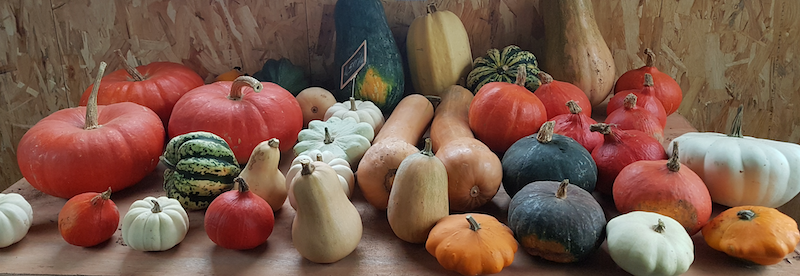
They offer one type of weekly vegetable and fruits basket and it costs 14 euros. Both farms offer organic vegetables and fruits, and I liked their approach to clients. They do not provide home delivery, though. Those who sign up have to pick the baskets up on certain days in various places in my neighbouring villages.
I did not want to increase our CO2 emissions by adding an extra car trip just for that purpose. Thus, it took me a while to choose the closest point, where I also have other errands nearby at their given time. Also, I cannot really choose the context of the basket and might end up with some veggies that I or the kids do not like. This would mean that I need to take extra time to learn about how to cook those in a way that the kids would appreciate. Buying local food would be my third priority eco-friendly grocery shopping tip for beginners.
HIGHLIGHTS
- The feeling of eco-joy I had when I saw our first plastic-free local organic vegetable basket and when shopping for organic food in bulk in Satoriz!
It also made me to discover vegetables that I had never cooked before and boosted my wish to improve my cooking! So, if you have some great vegetables recipes, please do share these with me!
And I am more convinced than ever that…
- Genuine well-being is only possible when we live in harmony with ourselves, with other humans, with God/Universe/Higher Power (or however you prefer to call the supernatural) and WITH OUR PLANET!
For many years, I have been blessed to enjoy a serene and happy life, being spiritual, loving myself, and having great relationships with many wonderful people. Yet for the past two months, looking for more harmony in my relationship with our beautiful planet Earth has brought me to a new level of internal peace, expanded my serenity, and reinforced my overall well-being!




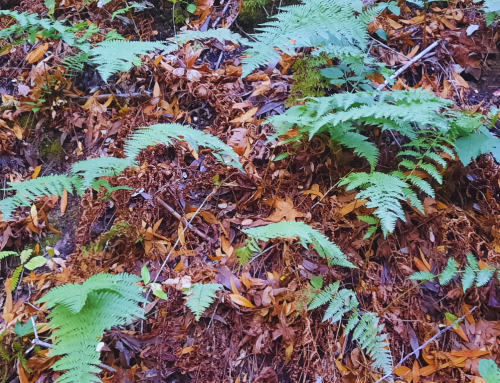

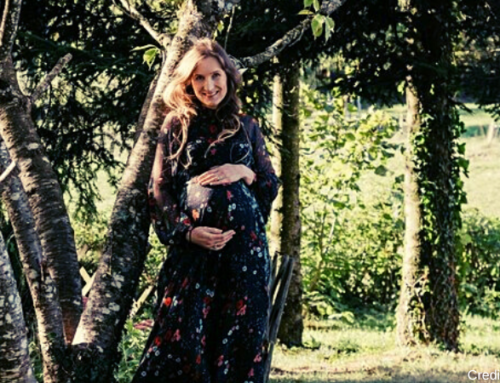


I am also a user of a local vegetable scheme – I pick my bag up once a week at a nearby community centre (5 min walk from home and on my cycle commute route anyway). Most of what we get is as locally grown as possible (a bit of a challenge in winter in the UK though so there is some stuff imported from continental Europe), to the extent of salad grown in the local parks and churchyards of our borough.
I have met and befriended a lot of new vegetables in the 6 years of using this scheme – who knew that “spring greens” and “winter greens” were actual plants? Fortunately the scheme also has a website with recipes that you can filter by the veg you need to use up – check out https://www.growingcommunities.org/our-recipes for some ideas. Although knowing what little I know about kids, I can’t really imagine a child consenting to eat any of these things 😀
Thank you Kitty for sharing about your experience! I am impressed how they are using urban parks and churchyards for growing salads, I hope also other cities will take this road. And I so relate to discovering new veggies through such themes – with few weeks I already had to face the challenge to use black radish and Swiss chard, vegetables I never used before in the cooking. Thank you also for sending the link to recipes – I need new ideas, indeed as I feel my cooking skills are not up to the level to use all these vegetables! For kids, what I have found is that I put many different veggies and make them into little pieces. Some of these they eat without a problem like that and they also have the opportunity to choose one ingredient and to leave it for me:-)
So inspiring!!
Except on a few occasions, I do my fruit and vegetable shopping at the farmers market only. I go there with a big backpack and there’s no plastic anymore, eventually some paper bags for little stuff. We normally only buy seasonal and local fruit and vegetable but there are a few exceptions, as you say: progress not perfection.
Thank you Maya for your comment! I have not yet been here in the neighbouring village in farmers market, but will plan to do it when the veggie baskets system is on break from January to April, I think.
Thanks for sharing. Our normal big supermarket store has started to sell things like rice/etc. in Bulk – bid of a hidden section but worth trying as to support the initiative, and I have found that stores start to do a full “bio section” which I personally appreciate. Another challenge is that my favorite Organic store is not stocking some basic things I love (like a specific orange juice) so I guess I prefer shopping at another place. Unsure where the right balance is.
Thanks Jim for your feedback! I agree and I also miss sometimes when I shop in an organic supermarket some of the things from the regular one. And yes, for me it is also about finding the right balance.
👍👍👍
Thank you Viive!